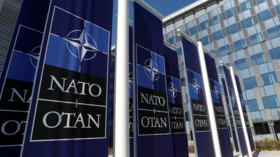NATO will cooperate with Russia, on one condition

NATO has said that it is ready to work on enhancing confidence-building measures with Russia on the condition that the Kremlin works to reduce tensions on the border with Ukraine
In a statement issued on Thursday, the US-led bloc insisted that any dialogue “would have to proceed on the basis of reciprocity, address [its] concerns about Russia’s actions, be based on the core principles and foundational documents of European security, and take place in consultation with” the NATO’s European partners.
It added that should Moscow “take concrete steps to reduce tensions, we are prepared to work on strengthening confidence-building measures.”
“We reiterate our long-standing invitation to Russia for a meeting of the NATO-Russia Council in the near future,” the statement read.
The notice comes amid worsening tensions between Moscow and the 30-member organisation. Speaking via secure video-link last week, Russian President Vladimir Putin told his US counterpart Joe Biden that his country is “seriously interested” in getting “reliable and firm legal guarantees” that would rule out NATO’s expansion further into Eastern Europe, as well as the deployment of “offensive strike weapons systems” nearby.
Putin’s proposal came in response to Biden’s “concerns” about Russian troops allegedly threatening Ukraine, which has long held aspirations to become a member of the bloc. The Russian leader, however, insisted that it was NATO “making dangerous attempts to conquer” the state’s territory and “building up its military potential at our borders.”
Ukraine’s intelligence service and a number of Western leaders have issued warnings in recent weeks that Moscow could be preparing an all-out invasion of its neighbor. The Kremlin has consistently rejected the allegations, instead voicing concerns about the prospect of the former Soviet republic potentially joining NATO.
Russian Foreign Ministry Spokeswoman Maria Zakharova said the expansion of the military bloc further eastwards is a red line for Moscow, and that Kiev’s potential accession is unacceptable. According to Zakharova, the US is dragging Kiev into the orbit of the military organization and turning it into a “bridgehead” of confrontation with Russia – a move which could destabilize Europe.
Last month, Russian Foreign Minister Sergey Lavrov stressed that past dialogue between the two proved futile, and that NATO was more interested in “whipping up propaganda and putting pressure on Russia” about Ukraine.
In October, Moscow announced that it would suspend all direct bilateral ties with NATO and shutter its offices in the Russian capital. The move came as a response to the bloc’s expulsion of eight Russian diplomats from its Brussels headquarters, believed to be over claims of involvement in undisclosed ‘espionage.’ Russia denies the charges.













